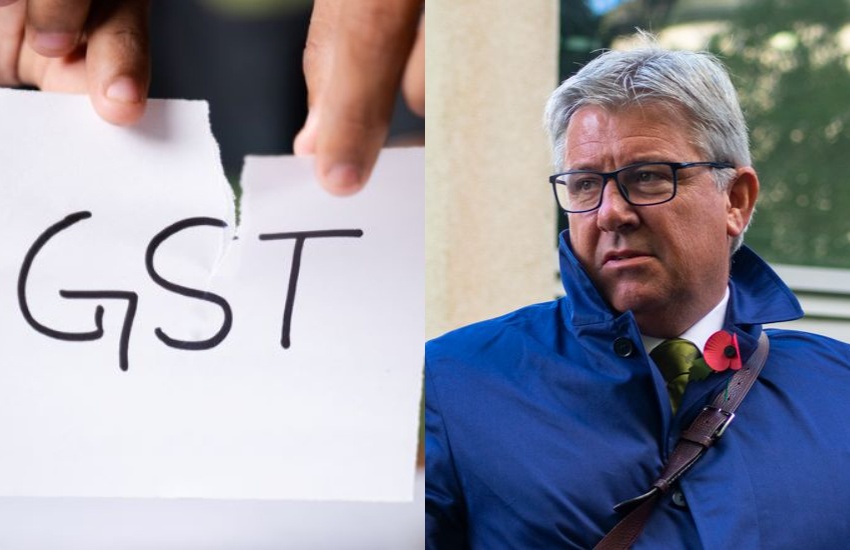


Deputy Mark Helyar opened debate on the States’ 2023 Budget this morning with a warning that spending increases next year may exceed an additional £48million initially allocated to committees.
The Policy & Resources Committee’s treasury lead set out proposals in the draft Budget for spending by committees totalling £573million next year – an increase of £48m or 9% on this year's budgets. And he raised the possibility that even this increase may not be enough.
"There is also, I’m afraid to say, a real risk that the pressure on expenditure will be greater than the provision made for it," said Deputy Helyar, pictured top.
"For example, each 1% overspend on the Committee for Health & Social Care’s budget would cost just over £2million."

Pictured: The Committee for Health & Social Care is set for a budget uplift next year of £24m or 12.7% - more than twice the rate of inflation now forecast by the States for 2023.
Deputy Helyar told States' members that it was the Assembly, not the Policy & Resources Committee, which was in the habit of agreeing new and expanded services and additional costs.
"It is worth repeating for the record and for the media that Policy & Resources has no means of enforcing a reduction of government costs," he said.
"That job requires financial self-discipline and falls upon committees, trading entity boards, their chairmen and in particular their members.
"I often hear members saying that Policy & Resources should wave a magic wand and do X or Y and speaking of the government as if it was separate from them or an entirely different third party.
"Well, it isn’t. We are all, collectively in this room, the government. We must all assume responsibility for solving the very significant fiscal problems which we now face."

Pictured: Deputy Helyar told his colleagues that they were all collectively responsible for restraining expenditure and resolving challenges with public finances.
The Committee's draft 2023 Budget includes a one-year pause in the gradual withdrawal of mortgage interest relief, which if approved will delay an increase of up to £600 to the tax bills of qualifying couples.
Deputy Helyar told the Assembly that the Policy & Resources Committee was concerned about further pressure which may be felt by mortgage holders in the months ahead.
"In recognition of the rising interest rate environment, a one-year pause in the phased withdrawal of mortgage interest relief…is recommended," he said.
"If things worsen during the year, the Committee may consider an emergency budget to review whether these allowances should be increased further."
But he warned that the cost to the States of the existing proposals to delay the withdrawal of mortgage interest relief would be equivalent to proposals in the 2023 Budget to raise additional income - for example, on duties.
"Overall, the proposals in this Budget to raise income are I’m afraid a drop in the ocean when compared to our fiscal challenges. They generate about £1.7m of the projected medium term requirement of £80-90m and the in-year impact of these measures is in effect cancelled out by the changes to mortgage interest relief withdrawal."

Pictured: Mortgage holders may be in line for further tax relief on interest payments next year if the Policy & Resources Committee judges that the pressure of interest rate rises has become too great.
The Committee is projecting that income will exceed day to day expenditure by £33m next year. However, States' policies assume that there will be investment in infrastructure and one-off replacement projects of around £76m a year. Once this capital spending is taken into account, there is a projected deficit of £43million.
The States have agreed capital spending projects for their current term which total more than £500m. Under present States' policies, the only way of funding those projects is to spend the island's reserves accumulated in previous years.
Deputy Helyar said there were "significant risks to the 2023 financial position" set out in the draft Budget "which either individually or in combination could result in an overall revenue deficit".
"Firstly, in times in high inflation, currently at 8%, which is in line with central forecasts with an expectation that it will fall as 2023 progresses, there is an increasing risk that revenues will grow at a smaller rate than expenditure. Each 0.25% mismatch has an impact of £1.5m. on the revenue budget.
"Further, a rapid rise in interest rates could impact on the housing market, which has been very strong over the past two years, both in terms of high prices and high transaction volumes. A fallback to pre-covid levels could see a reduction of £7m or so in our revenue budget.
"The continued contraction of and volatility in worldwide investment markets…could negatively impact the £26.6m estimate of investment income included in the 2023 Budget."

Pictured: Deputy Helyar and his colleagues on the Policy & Resources Committee know that they face an uphill task trying to persuade States' members to back the introduction of GST. But he used his opening speech on the 2023 Budget to emphasise the scale of the deficit in public finances and said the challenge needs to be faced in a landmark tax and spending debate in January 2023.
Deputy Helyar also used his opening speech on the 2023 Budget once again to draw the Assembly's attention to a medium-term deficit in public finances which the Committee projects could reach £85m a year by the end of the States' term.
"The States are operating a structural deficit today which is only being sustained by the use of reserves built up in the past. This means that actions have to be agreed in the very near future in order to maintain a sustainable financial position.
"Proposals will be put forward as part of the forthcoming tax review and decisions cannot be delayed any further. It is clear that small, incremental changes to existing taxation will not address the challenges that are being and will be faced. It is now unavoidable that there needs to be a fundamental change in our taxation system giving a significant and ongoing upwards shift in the amount of revenue raised.
"The only alternative to raising substantially more through taxation would be commensurate reductions in expenditure. If the States do not agree a package of taxation measures to address the deficit in January 2023, there will be a need for proposals to cut expenditure as part of the next Budget – maybe reductions of up to 10%.
"This would inevitably lead to hard-hitting and unpopular cuts to existing services and remove the capacity to introduce new ones."
The States have set aside up to four days to debate the draft 2023 Budget and non-contributory social security expenditure.
Tax breaks for renting out spare rooms could attract key staff
States to debate keeping local market homes for local residents
Tax breaks could encourage more affordable first-time homes
Housing plans to alleviate crisis
States spending set to increase by nearly £50m next year
Toughest situation for "donkeys' years"
Comments
Comments on this story express the views of the commentator only, not Bailiwick Publishing. We are unable to guarantee the accuracy of any of those comments.